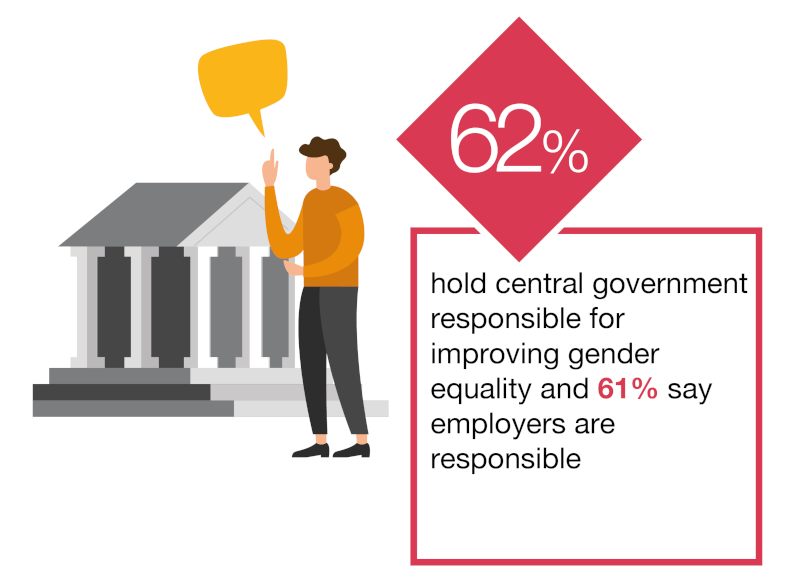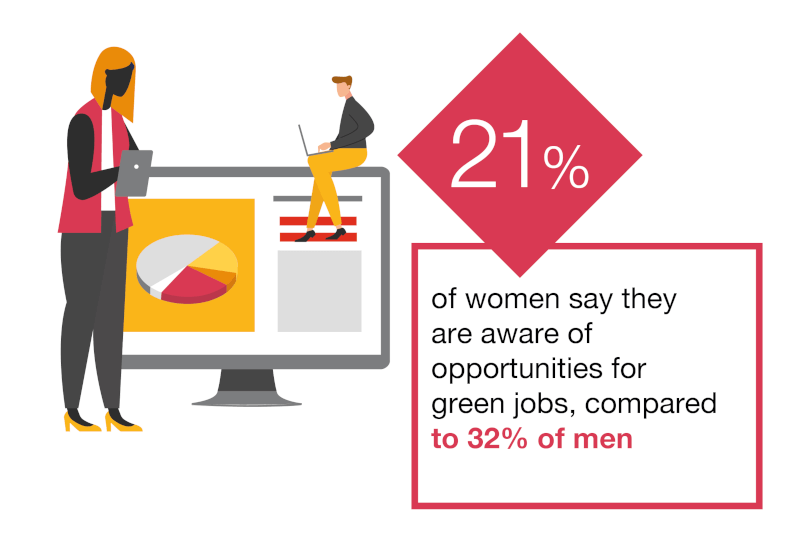
Targeting gender equality
The UK's economic recovery plan must put gender equality at its heart, raising awareness of jobs for women in growth industries - such as the green economy - and addressing the damage the pandemic has done to women's careers and wellbeing.
#FutureOfGov
Blueprint for equality
As the UK works towards economic recovery, government and employers are laying the foundations for a new working world. The shift towards hybrid working has the potential to increase wellbeing and productivity, while the focus on new and growing industries - in particular the green economy - offers fresh opportunities for the UK's workforce.
Yet our research, as part of our Future of Government programme, shows the vast majority of women are unaware of green job opportunities. Most women also believe they are ill equipped, lacking the right skills to benefit from the green economy. Our research reveals public backing for measures that will ensure women benefit from the green revolution. There are calls for better, more targeted careers support, improvements to parental leave and flexible working, and a greater focus on mental health and wellbeing.
While the government focuses on levelling up the country, the impact of the pandemic has shown that gender equality must not be overlooked. There is an opportunity for both employers and government to use the economic recovery as a blueprint for gender equality in the UK. A plan that embeds gender equality at its core, will shape future labour markets and bring about lasting change.
Challenges and opportunities

The pandemic has disproportionately impacted women's mental wellbeing and job prospects. Almost half (43%) of young women (18-24 years old) say their mental wellbeing has worsened (31% of men). Similarly, 41% of both women with children under 18 and women with part time jobs feel this way too (compared with 26% and 29% of men respectively).

Young women are most likely to report a deterioration in their job security due to the pandemic (23% compared to 17% for men), while 20% of women with children feel that the pandemic negatively impacted their career progression, compared with 16% of men. This echoes our Upskilling Hopes and Fears research, which found women are more likely to feel nervous about the future world of work than men (41% compared to 29% of men).

As the public looks towards a recovery from the pandemic, fears remain around womens' job security and progression. While most people (57%) feel that employers give equal chances for men and women to progress at work, over a third (35%) are concerned that a large opportunity gap remains. This rises to 47% for parents of preschool age children.
Furthermore, while 49% of men are satisfied with their career achievements, only 42% of women are satisfied. This falls to 38% for women with children, 35% for women aged 35-44 years old, and to 34% for women classed as C2DE - the three lower social and economic groups.

Looking ahead, most people feel ‘quite well prepared’ for different life events, but our research shows men feel they are consistently better financially prepared for life events than women.
Men feel 'very well prepared' to support children through education (37%), to access affordable housing (32%), to be financially comfortable in the year ahead (32%) and to save for a house deposit (31%). Meanwhile, fewer women feel 'very well prepared' for any of these life events: their top three are supporting children through education (31%), caring for elderly dependents (27%) and accessing affordable housing (25%).
“We can’t achieve the goal of successfully levelling up the UK if half of the population is at a disadvantage from the outset, regardless of where they live. The pandemic has accelerated what were already rapid changes in the world of work but this revolution should be of benefit to everyone. It’s crucial that gender equality is placed at the heart of the green and fair recovery plans and this will mean further interventions from both employers and policy-makers.”
Five factors for success

"From discussions with our people and clients, we know greater flexibility can make a real difference, helping support greater work-life balance and giving our people more autonomy and confidence to create ways of working that suit them best."
The pandemic has served as a great experiment for remote working, testing the benefits and pitfalls of managing a workforce from afar. The advantages have compelled many employers to announce that hybrid working will become 'the norm'. As employers rethink their policies there is an opportunity for them to lead the way on the agenda, by addressing the gender inequalities laid bare by the pandemic.
Our survey found that although 44% of the public feel their employer supports their caring responsibilities, there are many actions that employers could take to provide even greater support. Around three quarters of women want employers to provide more flexible options on working hours (75%) and working locations (72%), and more support on returning from maternity leave (74%).
More than two thirds of men and women favour promoting a better work-life balance (74%), and equalising maternity and paternity policies (68%). We also found that when choosing between employers, the majority of men focus on financial reward (56%), while women favour flexible working (59%) above financial reward (51%), followed closely by wellbeing (49%).
Employers can embed equal opportunities in hybrid working models by focusing on providing flexibility in both hours and working locations, and by offering greater support for caring responsibilities and consideration of employee wellbeing.

While both central government and employers are seen by almost two thirds of the UK public to have responsibility for improving gender equality, when asked to make a choice central government comes clearly in first place.
Men and women have similar priorities for government interventions to improve gender equality. According to the UK public, the government interventions that would most effectively level up gender opportunities include: targeted careers support for women to access traditionally male dominated industries (47%), more affordable childcare and improved shared parental leave (both 39%).
Government has a role to play in supporting women in work through legislation, for example on parental leave, and through the greater regulation of fragmented, often male dominated labour markets, such as construction. It also has an important role as an employer itself to promote gender-balanced workforce policies and best practice.
Outside work, women identify better access to healthcare, alongside improved financial stability, as the standout factors that would have the most positive impact on their lives (both 40%). More than a third (36%) of 45-64 year old women feel their physical wellbeing has worsened during the pandemic (25% for men) as do 35% of women with children under 18 (20% of men). Among parents, the mental health of women with pre-school age children appears most impacted (42% say that their mental health has worsened compared to 25% of men).

According to PwC’s latest Women in Work Index, reducing gender inequality and increasing the proportion of women in work offers a potential annual boost of £48bn to the UK economy. As the economy shifts, there is an opportunity to ensure that gender equality is embedded in new growth industries from the outset.
A prime example of this is the green jobs agenda. In preparing the UK workforce for recovery, the government maintains that "green and growth go hand-in-hand". The public agrees that the government is right to invest in green jobs (63%), but our research suggests that women are at risk of being left behind in this green revolution.
Women have a lower level of awareness around the opportunities in green jobs, at 21% compared to 32% awareness in men. Meanwhile, only 20% of women say they have the skills they need to work in a green job, compared with 31% of men.
It is vital for business and government to work together to deliver an economic recovery plan that builds gender equality into the industries of the future.

Investing in careers advice services to help young people make informed choices can have a pivotal impact on their futures. This is particularly the case where new industries are emerging - from green jobs to advanced technology - where there are already signs of gender disadvantages being reinforced, rather than reduced.
While almost half (47%) of the UK public favours targeted careers support for women entering the workforce, there is a long way to go before equal access is seen across all sectors. In our polling, only around a quarter (27%) of women surveyed (compared to 30% of men) feel that the career advice they received at school helped them make informed decisions.
Interventions by employers favoured by the public include targeted programmes to raise awareness of career opportunities for women (59%) and the upskilling of women through outreach programmes (58%), as well as individual coaching and mentoring for women (54%).
Careers support isn’t only for the young. Almost half (48%) of those polled say they would choose a different career path if they had another chance. With labour markets changing and a job for life a thing of the past, making sure that people can access careers support across their working lives is also important.

For many people, their working life is not continuous: at some points people may be unemployed and seeking work, on parental leave, doing unpaid work such as caring for relatives, or they could be economically inactive.
Those we surveyed who are currently unemployed report different challenges in their search for a job. For men, the top three barriers are a lack of skills and problems with physical or mental health (both 27%) and the lack of a well-paid job ‘for people like me’ (25%).
For women, the primary barrier (32%) is lacking the confidence to return to work. A similar proportion feel they lack the skills to get a job (31%). In addition, 38% of unemployed women feel the pandemic has worsened their access to employment opportunities (compared to 23% of unemployed men).
This points to the important role of taking a broad approach to shaping women’s return-to-work programmes that addresses both their need for technical reskilling or training, alongside building confidence and addressing barriers to wellbeing.
"This research highlights the mental health burden and lack of confidence or opportunities for young women starting their careers, as well as the challenges working mothers face. The UK has the chance to address these inequalities as it plans its recovery. As the momentum of the green revolution builds and new industries emerge, policy-makers and businesses can work side-by-side to level the playing field, allowing women to play a leading role in shaping the future."
Contact us

Leader of Industry for Government and Health Industries, PwC United Kingdom
Tel: +44 (0)7841 783022


















